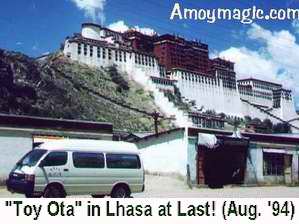"He is like a tree planted by streams of water, which yields its fruit in season and whose leaf does not wither. Whatever he does prospers." Psalms 1:3

"For one year, plant seeds; for ten years, plant trees; for 100 years, plant people." Chinese saying.
"I have planted, Apollos watered, but God gave the increase." 1 Cor. 3:6 KJV
A couple weeks ago I visited Changxing and Jiangyin, between Shanghai, Nanjing and Hangzhou, with Mr. Alan Smith, founder and director of the Livcom Awards, and while at both cities we we handed shovels with red ribbons to plant a memorial tree. It was a nice change--planting a tree instead of being up a tree.
Chinese love trees, and have long had many proverbs about them. For example, they say we plant flowers for this generation but trees as shade for the next generation. But my favorite quote is engraved on a large rock beside Furong Lake on Xiamen University: "For 1 year, plant a seed; for 10 years, plant a tree; for 100 years plant people."
Chinese love planting trees. Changxing, a county near Shanghai entering the 2008 Livcom Awards in Dongguang, plants almost 2 million trees per year, 1/3 of them by volunteers. But China's most ambitious project is the "Great Green Wall"...
Great Green Wall Our family saw the Great Green W
 all in 1994, while driving through the Gobi Desert during our 40,000 km. drive to Tibet and back. The largest ecological project in history, this $8 billion 2,800 mile 9 million acre network of forest belts is being built to stop expansion of the Gobi Desert, which grows about 950 square miles per year (2/3 the size of Rhode Island!) and is now within 150 miles of Beijing.
all in 1994, while driving through the Gobi Desert during our 40,000 km. drive to Tibet and back. The largest ecological project in history, this $8 billion 2,800 mile 9 million acre network of forest belts is being built to stop expansion of the Gobi Desert, which grows about 950 square miles per year (2/3 the size of Rhode Island!) and is now within 150 miles of Beijing.The Great Green Wall started in 1978 and by 2010 should stretch from Beijing to Mongolia.
It is 775 to 1,755 feet wide, with a sand fence, checkerboard patterns of vegetation, and a 6-foot-wide gravel platform.
Will it work? Some experts say no, but the U.S.' 100-mile strip of native trees built in the 1930s helped heal the Dust Bowl, reducing airborne soil 60% (though China's desert is much more arid than America's midwest). At least the Chinese are not ignoring the problem, but looking ahead.
Looking Back; Looking Ahead Churchill said "the farther backward you can look, the farther forward you are likely to see... " If that is true, it might explain why Chinese are planting trees for a project that won't be finished until 2050. Chinese have a lot of history behind them. In China, everything is ancient--including the sauce in a family wok...
Ancient Sauce A famous Xiamen University artist, Tang Shaoyun, told me that in Sichuan they never wash their woks, so that over the years the residue accumulates, adding a rich flavor to everything cooked in them. Professor Tang said one family in Sichuan has not washed their wok for over 200 years. He laughed and said, "Their sauce is older than your country!"
Churchill had a point when he said that looking back can help us look ahead, because if you study history it does seem that we keep making the same mistakes over and over. This seems especially true as American elections approach and we hear candidates on both sides make the same speeches and promises we heard eight years ago and two decades ago.
But rather than just allow the past to give us a window upon the future, we'd be better to allow it to instruct our present. The past is water under the bridge, and today is the only time we have to write the future, and we write the future with people.
The biggest investment in the future is people, and while we may not actually "plant" many people (I suppose my two sons counts as two I've planted), we most certainly have the potential to either nurture or harm every person we come in contact with. It is sobering to consider how our words and actions towards people today can have compound affects upon many people and generations to come.
Do we build up or tear down? Are we nourishing or destroying?
Transplanting People. While we may not "plant" m
 any people, we can, by our actions, have such a strong influence that we may actually lift some people out of poor, barren soil and replant them besides streams of living water. How many lives have you changed for the better?
any people, we can, by our actions, have such a strong influence that we may actually lift some people out of poor, barren soil and replant them besides streams of living water. How many lives have you changed for the better?Each person we meet today is an opportunity to nourish, plant or transplant a tree for the future. So grab your spade with the red ribbon and your watering bucket and be prepared. But first make sure you yourself are well planted, in rich soil. Otherwise it is just the blind planting the blind.
www.amoymagic.com





No comments:
Post a Comment
Please leave a comment!